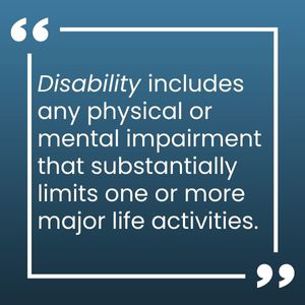
- Compliance
Is Addiction a Disability under the ADA?
The Americans with Disabilities Act protects individuals with a wide range of disabilities including those who have an addiction to alcohol or drugs. To make sure your practice is in compliance, educate your staff and incorporate the recommended ADA policies and procedures.
If you’ve ever wondered, “is addiction a disability under the ADA?”, you’re probably not alone.
Recent studies found that many physicians, nurse practitioners, and physician assistants lack basic knowledge about the Americans with Disabilities Act ("ADA").1 In a survey of physicians in outpatient practice, 36% said they knew “little or nothing” about their legal responsibilities under the ADA and 68% acknowledged they were at risk for ADA lawsuits.2
Basic knowledge about the ADA, such as who it protects and what constitutes discrimination, is essential for compliance. Title III of the ADA prohibits disability-related discrimination by “public accommodations.” A “public accommodation” includes “the professional office of a healthcare provider.”3 The ADA requires medical practices to ensure equal treatment for all patients. To do this, medical practices must:
- make reasonable modifications to policies and procedures,
- offer facilities and medical equipment that are physically accessible, and
- provide auxiliary aids and services to communicate effectively with patients with vision, hearing, or speech disabilities.

The ADA protects individuals with a wide range of disabilities, not just those with hearing, sight, and mobility impairments. Many health care professionals may be surprised to learn just how broadly the ADA defines “disability.” “Disability” includes any physical or mental impairment that substantially limits one or more major life activities.4 Many conditions qualify as a “disability” under the ADA, including addiction to alcohol or drugs.5
In recent years, the U.S. Department of Justice (“DOJ”) has been investigating claims of discrimination against patients with opioid use disorder (OUD). These cases involve allegations that hospitals, practices, and other health care entities violated the ADA by denying care to patients taking buprenorphine and other medications to treat OUD. The Department of Justice has settled five of these cases in three years.6 Read on for a summary of a case against a physician practice.
Physician Practice Settles Allegations that it Denied Care to Patients Taking Buprenorphine
In a 2021 settlement, an orthopedic practice paid $30,000 and agreed to adopt ADA-compliant policies, procedures and implement ADA training for employees. Two patients alleged the practice refused to perform joint replacement procedures because the patients were taking buprenorphine to treat OUD. The Department of Justice investigated, substantiated the allegations, and concluded the practice followed a policy that violated the ADA.6 Specifically, the DOJ found that: 7
- The surgeons performed surgeries at a local hospital (“hospital”).
- The hospital had an anesthesia protocol requiring that patients prescribed buprenorphine be maintained on buprenorphine before, during, and after the procedure.
- The surgeons had safety concerns about managing post-operative pain in patients taking this medication and therefore elected not to perform joint replacement surgeries on patients prescribed buprenorphine.
MICA members and practices should take note of valuable takeaways from this case, including:
- Discrimination includes using eligibility criteria that excludes people with disabilities. In this case, people recovering from drug addiction were excluded because they used buprenorphine.8
- Practices must make reasonable modifications to policies and procedures when necessary to ensure equal access to care for individuals with disabilities.9
Read more about other ADA cases filed against physician practices in Arizona and Utah alleging discrimination against patients with mobility and hearing disabilities.
Guidance for ADA Compliance
The DOJ recently issued guidance explaining how the Americans with Disabilities Act protects patients in treatment for substance use from discrimination. Physicians and practices can reduce risk by incorporating the guidance into their ADA policies and procedures and physician and staff education. The guidance explains these basic principles: 10
- People with OUD typically have a “disability” because they have a drug addiction that limits at least one major life activity.
- The ADA generally protects patients in treatment or recovery from OUD unless they are currently using drugs illegally.
- Refusing care to patients or potential patients because they are taking prescription medications for OUD is discrimination. An example of this that the DOJ provided is when a doctor’s office has a blanket policy of denying care to patients receiving treatment for OUD. The office would violate the ADA if it excludes individuals based on their OUD.
- The ADA also protects individuals with a history or “record of” OUD, who are not currently in treatment.
- With limited exceptions, the ADA does not protect individuals with OUD who are engaged in the current illegal use of drugs. The term "current illegal drug use" refers to illegal drug use that has occurred recently enough to warrant the belief that the person using drugs is still doing so, or that they are likely to continue using drugs.
Develop Policies and Educate Employees

The opioid crisis worsened during the COVID-19 pandemic. As a result, health care providers may see more patients with OUD and other substance use disorders in coming years. To avoid legal action, practices should review their policies and make sure their employees are properly trained on ADA compliance. Here are three things to do NOW to strengthen your ADA compliance program:
- Develop a non-discrimination policy outlining processes for compliance with Title III of the ADA. Post the policy in the patient waiting area and add a link on the practice’s website.
- Provide the policy to current employees and contractors, and require that new employees receive it within 30 days of being hired.
- Develop an annual ADA education program for all employees and maintain detailed attendance logs.
[1] Iezzoni L.I., Rao S.R., Ressalam J., Bolcic-Jankovic, Agaronnik N., Lagu T., Pendo E., & Campbell E. (2022, January). US physicians’ knowledge about the Americans with disabilities act and accommodations of patients with disability. Health Affairs, 41(1), 96-104; Merk, A., Nelson, E., Provost, A., Rasch, M., Forster, L., Nottingham, K., Simon, J., & Fredricks, T. (2021 March). A survey on health professionals’ understanding of federal protections regarding service dogs in clinical settings. J. Osteopath Med. 121(3):247-253.
[2] Iezzoni L.I., Rao S.R., Ressalam J., Bolcic-Jankovic, Agaronnik N., Lagu T., Pendo E., & Campbell E. (2022, January). US physicians’ knowledge about the Americans with disabilities act and accommodations of patients with disability. Health Affairs, 41(1), 96-104.
[3] 28 CFR § 36.104.
[4] 28 CFR § 36.105(a)(1)(i). An individual who has “a record of such an impairment” or is “regarded as having such an impairment” also qualifies as an individual with a “disability.” Id. at (a)(1)(ii)-(iii).
[5] Id. at § 36.105(b)(1) & (2). The following diseases or conditions also qualify as physical or mental impairments under the ADA: orthopedic, visual, speech, and hearing impairments, HIV, Attention Deficit Hyperactivity Disorder, cerebral palsy, epilepsy, muscular dystrophy, multiple sclerosis, cancer, heart disease, diabetes, intellectual disability, emotional illness, dyslexia and other specific learning disabilities, and tuberculosis.
[6] U.S. Attorney's Office Settles Disability Discrimination Case With New England Orthopedic Surgeons.
[8] 28 CFR § 36.301(a). The only exception is where the practice can show that the criteria is necessary for the care being offered. Practices should always consult legal counsel before relying on this exception.
[9] 28 CFR § 36.302(a). Modifications are not required where the practice can demonstrate that they would fundamentally alter the nature of the care or service provided. This is a challenging and often impossible burden to meet. Practices should always consult legal counsel before relying on this exception.

